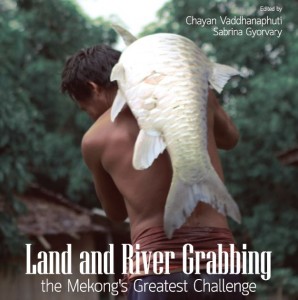Land and River Grabbing: The Mekong’s Greatest Challenge
By Center for ASEAN Studies and The Regional for Social Science and Sustainable Development • July 29, 2015 Throughout the Mekong region, large-scale development projects such as hydropower dams, mines, conventional power plants, and mono-crop plantations are displacing communities and limiting access to natural resources. Several hydropower dams have already been built on the Upper Mekong in China’s Yunnan Province, and the governments of Cambodia, Laos and Thailand are planning eleven additional large dams on the Mekong River’s mainstream. If completed, these dams would not only destroy local ecosystems, but also reduce the fl ow of silt throughout the Mekong River system, and block major fi sh migrations, placing at risk over sixty million people who depend on the Mekong for their food security and income.
Throughout the Mekong region, large-scale development projects such as hydropower dams, mines, conventional power plants, and mono-crop plantations are displacing communities and limiting access to natural resources. Several hydropower dams have already been built on the Upper Mekong in China’s Yunnan Province, and the governments of Cambodia, Laos and Thailand are planning eleven additional large dams on the Mekong River’s mainstream. If completed, these dams would not only destroy local ecosystems, but also reduce the fl ow of silt throughout the Mekong River system, and block major fi sh migrations, placing at risk over sixty million people who depend on the Mekong for their food security and income.
It’s vital for citizens of all six nations who share the Mekong basin’s rich resources to work together to promote greater accountability in development planning. This is exactly what is happening among a new generation of Mekong activists. Over the past nine years, alumni from EarthRights International’s Mekong School representing communities from the source to the mouth of the Mekong have been working together to advocate for stronger human rights and environmental protection in the region.
In sharing these reports from their communities, Mekong School Alumni hope to inspire citizens throughout the Mekong region to consider the social and environmental impacts of hydropower dams, mines, power plants and other large development projects and to join together to advocate for greater transparency and public participation in development planning.
Download the full report PDF here.
Tags: ASEAN, Center for ASEAN Studies and The Regional for Social Science and Sustainable Development, Environmental and Economic Justice, Environmental issue, Hatgyi Dam, HealthThis post is in: ASEAN, Business and Human Rights, Crimes Against Humanity, Displacement, Environmental and Economic Justice, Ethnic Nationalities, Health, Human Rights, Law
Related PostsBurma Partnership Celebrates Continuing Regional Solidarity for Burma and Embraces the Work Ahead for Progressive Voice
Myanmar’s New Dawn :Opportunities for Aung San Suu Kyi and U.S.-Myanmar Relations
Expanding People’ Solidarity for a Just and Inclusive ASEAN Community
Civil society launches #FreeThe5KH campaign in support of the imprisoned ADHOC staff and NEC official
Myanmar logging ban a major step to forest sector reform









 All posts
All posts